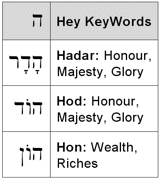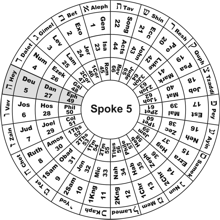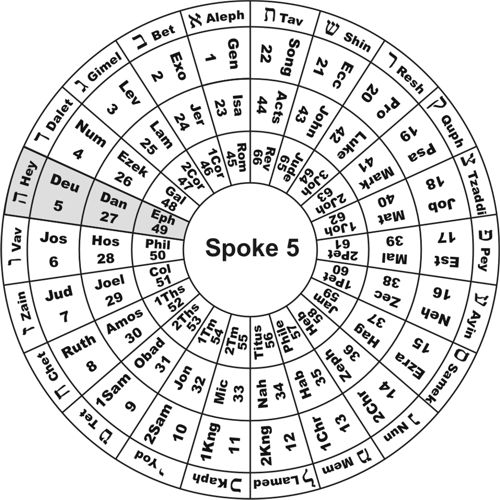God's Honour and Majesty
The king spake, and said, Is not this great Babylon,
that I have built for the house of the kingdom by the might of my power, and for the honour of my majesty (hadar)?
While the word was in the king’s mouth, there fell a voice from heaven, saying, O king Nebuchadnezzar,
to thee it is spoken; The kingdom is departed from thee. And they shall drive thee from men,
and thy dwelling shall be with the beasts of the field: they shall make thee to eat grass as oxen,
and seven times shall pass over thee, until thou know that the most High ruleth in the kingdom of men,
and giveth it to whomsoever he will.
Daniel 4:30ff (Spoke 5, Cycle 2)
This passage lies in the heart of one of the most stunning thematic convergences to be seen on any Spoke
of the Wheel. Nebuchadnezzar's proud claim that he had built "great Babylon" by "the might of my power"
forms a KeyLink to the exact passage where God warned His people against doing that very thing!
Searching for all verses containing the two phrases ("my power", "the might") [Verify] yields one and only one other verse,
which "just happens" to be from the first book on Spoke 5:
Beware that thou forget not the LORD thy God, in not keeping his commandments,
and his judgments, and his statutes, which I command thee this day: Lest when thou
hast eaten and art full, and hast built goodly houses, and dwelt therein; And when thy herds and
thy flocks multiply, and thy silver and thy gold is multiplied, and all that thou hast
is multiplied; Then thine heart be lifted up, and thou forget the LORD thy God, which brought
thee forth out of the land of Egypt, from the house of bondage; ... And thou say in thine heart,
My power and the might of mine hand hath gotten me this wealth.
Deuteronomy 8:11ff (Spoke 5, Cycle 1)
 Now look at the context of this KeyLink.
God is warning against their heart being lifted up when they entered the Promised Land to
receive all that He was going to give them, as if they had gained everything by their own power and might.
Daniel used exactly the same language when he interpreted the "writing on the wall" for
Nebuchadnezzar's son, King Belshazzar, and explained that all his father's
wealth and power were given by "the most high God": Now look at the context of this KeyLink.
God is warning against their heart being lifted up when they entered the Promised Land to
receive all that He was going to give them, as if they had gained everything by their own power and might.
Daniel used exactly the same language when he interpreted the "writing on the wall" for
Nebuchadnezzar's son, King Belshazzar, and explained that all his father's
wealth and power were given by "the most high God":
O thou king, the most high God gave Nebuchadnezzar thy father a kingdom,
and majesty, and glory, and honour (hadar): ... But when his heart was
lifted up, and his mind hardened in pride, he was deposed from his kingly throne, and they took his glory from him:
Daniel 5:18ff (Spoke 5, Cycle 2)
Nebuchadnezzar failed to acknowledge, let alone thank, God for the kingdom He had given him,
and so God humbled him until he knew "that the most High ruleth in the kingdom of men,
and giveth it to whomsoever he will." This now brings us to yet another KeyLink, more wondrous
than all the others combined. The two passages from Daniel quoted above use the
Hey KeyWord hadar (honour). Both the Prophet Daniel and King Nebuchadnezzar
used this word to described his kingdom, and after his understanding and reason returned to
him, Nebuchadnezzar used it three more times to praise God for what He had done:
And at the end of the days I Nebuchadnezzar lifted up mine eyes unto heaven, and
mine understanding returned unto me, and I blessed the most High, and I praised and
honoured (hadar) him that liveth for ever, whose dominion is an everlasting
dominion, and his kingdom is from generation to generation: And all the inhabitants of the
earth are reputed as nothing: and he doeth according to his will in the army of heaven,
and among the inhabitants of the earth: and none can stay his hand, or say unto him,
What doest thou? At the same time my reason returned unto me; and for the glory of my kingdom,
mine honour (hadar) and brightness returned unto me; and my counsellors
and my lords sought unto me; and I was established in my kingdom, and excellent majesty
was added unto me. Now I Nebuchadnezzar praise and extol and honour (hadar)
the King of heaven, all whose works are truth, and his ways judgment: and those that
walk in pride he is able to abase.
Daniel 4:34ff (Spoke 5, Cycle 2)
The last verse forms the Alphabetic KeyLink.
Searching the Bible for all verses that use hadar (honour) in conjunction with works
and the pronoun I yields exactly two verses:
King Nebuchadnezzar uniquely fulfilled the Hey verse of AV Psalm 145 when he honoured God
in the Book of Daniel on the Fifth Spoke! The implications of this wonder surpass the limit of
human language. I can praise God for this blazing miracle with no greater words than those spoken
by Nebuchadnezzar after he had learned the lesson God taught him:
Nebuchadnezzar the king, unto all people, nations, and languages,
that dwell in all the earth; Peace be multiplied unto you. I thought it good to shew the signs
and wonders that the high God hath wrought toward me. How great are his signs! and how mighty are
his wonders! his kingdom is an everlasting kingdom, and his dominion is from generation to generation.
Daniel 4:1ff (Spoke 5, Cycle 2)
 God used the KeyWords hadar and hod
(of essentially the same meaning) together in two Alphabetic Verses. I list them with a third KeyWord,
hon (wealth) since it touches a related theme: God used the KeyWords hadar and hod
(of essentially the same meaning) together in two Alphabetic Verses. I list them with a third KeyWord,
hon (wealth) since it touches a related theme:
- AV Psa 145:5 I will speak of the glorious honour (hadar) of thy majesty (hod), and of thy wondrous works.
- AV Psa 111:3a His work is honourable (hod) and glorious (hadar)
- AV Psa 112:3a Wealth (Hon) and riches shall be in his house:
In the first verse, hadar is the primary KeyWord followed by hod, and in the second,
hod is followed by hadar. In both cases, God used alliteration to emphasize the meaning of Hey.
This is very common in the Alphabetic Verses (see BW book pg 305).
|



